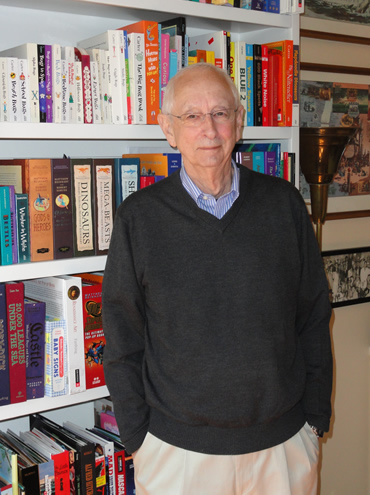
Sterling Hennis, faculty emeritus of the School of Education, was remembered on March 2 at a service at University United Methodist Church in Chapel Hill. Hennis, who died last month at age 88, was a beloved member of the faculty at the School of Education for 37 years.
Author Clyde Edgerton (A.B.Ed. ’66, MAT ’73, Ph.D. ’77) gave the following tribute to Hennis:
I met Sterling over a half century ago – he was my college advisor. As I got to know him, he became a kind of buddy-brother-friend-father. He, along with Anita, significantly changed the course of my life. I know other people here feel the same, that Sterling and Anita changed their lives too.
As a teacher, Sterling modeled an infectious excitement about language, expression, and creativity and by extension — an infectious excitement about being in the world. And beneath the funny stuff was an inspiring bright light. For many of us, he helped press the courage button, the take-a-chance button.
For example: While I was having problems as a high school teacher with a difficult class, I went to him, described my tough situation at some length. He had six words for me: “Let them do a puppet show.”
I pressed the take-a-chance button and experienced one of the most delightful and instructive experiences of my life. I and my students became learners through our interest and involvement in what we were actively doing.
Sterling was a humorist, philosopher, artist, book collector, film critic, writer, and fierce Democrat. Early in his life, he was a middle school English teacher and then during his professorship at UNC, a teacher of English teachers.
With humor and deep conviction, he led students to experience language with love. He taught through filmmaking and puppetry and reader’s theater and other activity-related techniques. He wanted students to live with a joy of language. It took some of us a while to realize that Sterling was teaching us also how to live our lives.
By teaching life with a love of language and creativity, rather than teaching “English,” he demonstrated vocabulary instruction without lists, sentence construction without diagramming, and the nurturing of a permanent reading habit through interesting books and film.
He saw the danger of students as consumers of information rather than as creators. Always a prophet, he fought consumerism by uncovering acts of invention in his students.
Beneath Sterling’s method – in teaching teachers – was this message: If you love what you are doing and listen well, then you will always learn with, and be inspired by, your students.
At some point I may have begun to take Sterling for granted – to forget what he and Anita had meant to me, and to Susan, my wife when I was in grad school. Sterling helped get her a job and he and Anita became our daughter, Catherine’s, god-parents.
And then years later, just after my second marriage, when my wife Kristina and I were getting ready to go on our honeymoon the conversation went like this: I said “Where should we go?” She said, “What about London?” I said “Okay.”
Then she said this: She said, “I want Sterling and Anita to come with us.”
I said, “Great idea.”
We invited them, and they came. We had a blast, and through recent years, they loved our children, Nathaniel, Ridley, and Truma, like grandparents. They have been for us: all about family and brightness and love.
Sterling and Anita will forever be with so many of us here today — in so many ways.